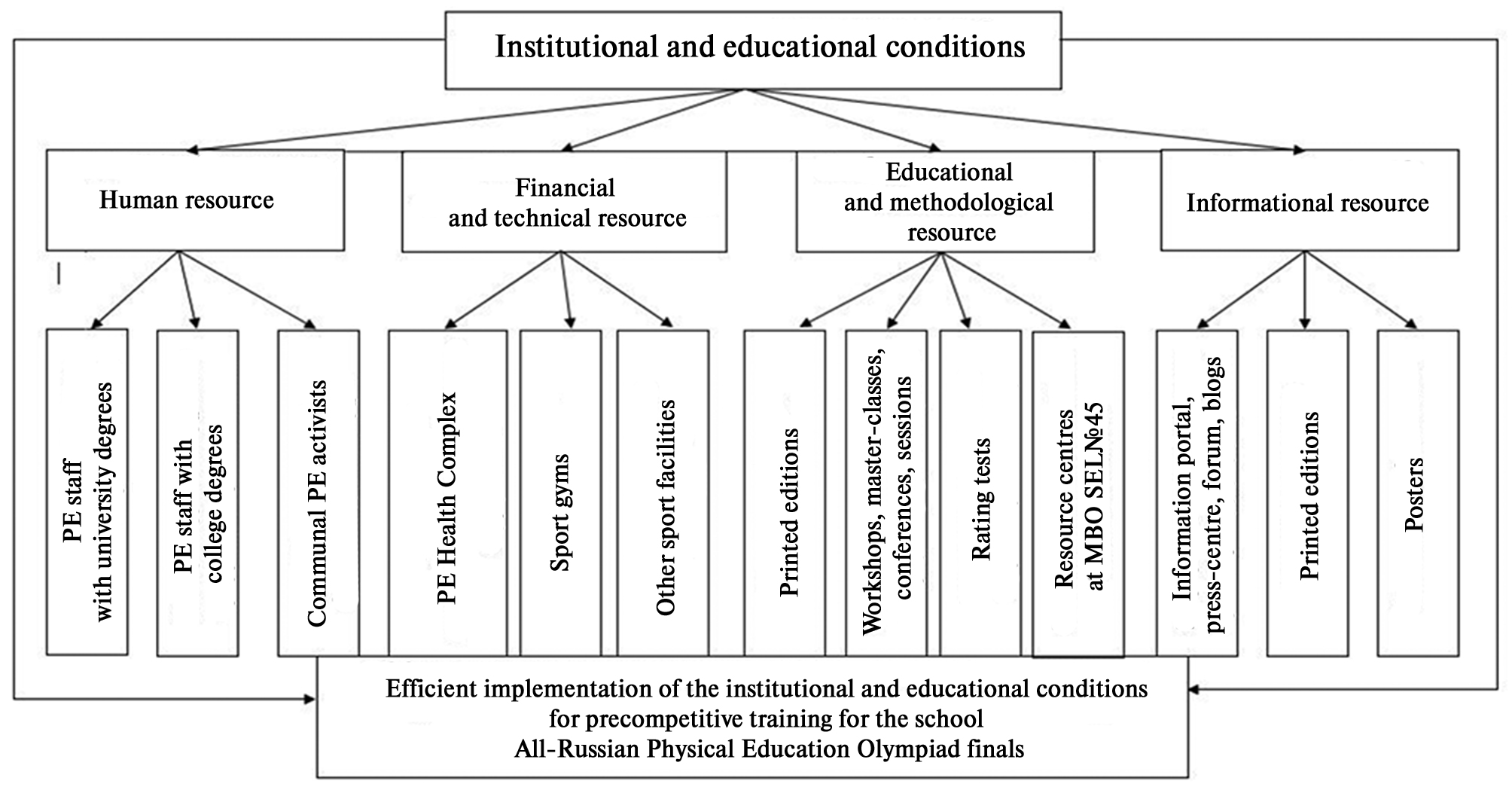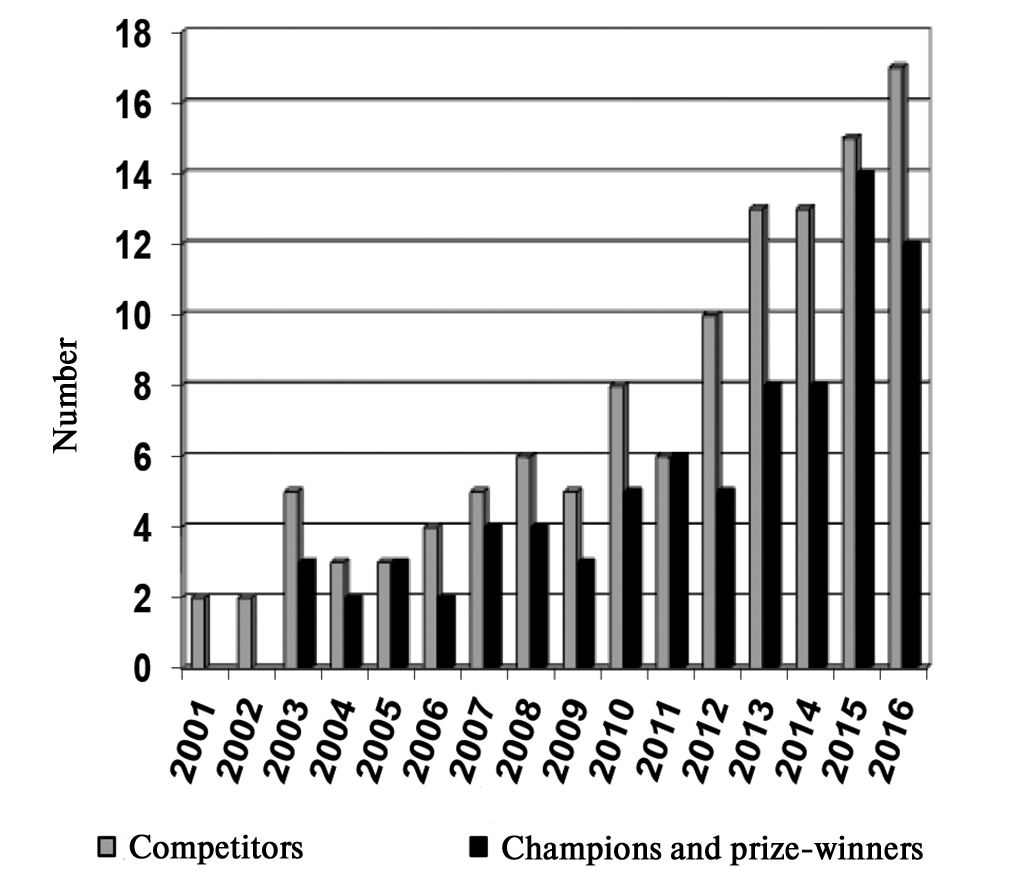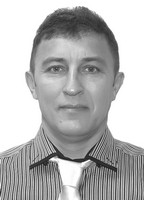Organizational and educational conditions for schoolchildren's precompetitive training for All-Russian Physical Education Olympiad finals
Фотографии:
ˑ:
Associate Professor, PhD A.A. Rayzikh1
Associate Professor S.S. Maksimova1
Associate Professor E.S. Ivanova1
Associate Professor, PhD A.E. Alabuzhev1
1Udmurt State University, Izhevsk
Keywords: institutional and educational conditions, All-Russian Physical Education Olympiad.
Background. The ongoing Russian education system reform sets new requirements to the physical education system applied at the national general education establishments. Presently the physical education theoreticians and practitioners recognise the need for the existing physical education system to be seriously restructured so as to ensure transition from the existing system designed to develop certain physical qualities and vitally important motor abilities and skills to the system giving profound knowledge of the human body and modern means to protect and improve physical abilities and health. The new system will also cultivate the natural need for healthy lifestyle and physical improvement through active physical training and sports.
It is the school Physical Education Olympiad that is considered today the most promising and innovative initiative in the variety of other forms of school physical education. It is the high relevance of the Olympiad design and content harmonized with the school education materials and the competitive opportunities it gives to prove the school progress that makes it so valuable and different from the other forms [5].
Fully acknowledging great benefits of the All-Russian Physical Education Olympiads, some authors (N.N. Chesnokov, A.A. Krasnikov) still note their institutional and practical drawbacks [1, 4] including the following: their stages have not always been successfully organized and managed; the Olympiad programs have often lacked versatility; failure to design the Olympic tests on the principle “from simple to difficult”; imperfect rating and scoring systems to nominate the Olympic tests winners in different age categories of schoolchildren; inadequate professional competences and skills of the judges at the Olympiads; need for an efficient feedback from the competitors to educators and methodologists; delays in keeping the local government agencies and educational establishments informed on the event, etc.
Therefore, there is a demand for improvements in the following: Olympiad design and management technologies; content of the theoretical knowledge tests and practical skill tests; and staged schedules of the All-Russian Physical Education Olympiad [2-4].
Objective of the study was to find and test by experiment the institutional and educational conditions of precompetitive training for the All-Russian Physical Cultural Olympiad finals.
Methods and structure of the study. The initiative to study the proposed institutional and educational conditions of the precompetitive training for the All-Russian Physical Education Olympiad finals was implemented together with the Republican Subject Methodology Control Commission at Udmurt State University.
It is traditional that precompetitive training for the All-Russian Physical Education Olympiad finals is designed in few stages. Tests under each stage are designed on a gender-specific basis for the relevant three age groups, as provided by Table 1 hereunder.
Table 1. Stages of the All-Russian Physical Education Olympiad
|
|
Stage |
Competitors |
Terms |
Organisers |
|
I |
School |
5-11 forms |
01.09 –15.11 |
Local government agency in charge of the school educational sector control |
|
II |
Municipal |
7-11 forms |
16.11 – 25. 12 |
|
|
III |
Regional |
9-11 forms |
10.01 – 10.02 |
Regional government agency in charge of the educational sector control |
|
IV |
Final |
9-11 forms |
20.03 – 01.05 |
Ministry of Education and Science of the RF |
The Olympiad organisers will: form an Organising Committee and jury for every stage of the event; form Subject Methodology Control Commissions and approve their compositions; develop and have approved requirements to the Olympiad and every stage management instructions, including the key criteria for the Olympiad test design and rating systems; inform the management and students of the relevant educational establishments on the terms and participation requirements of every Olympiad stage; set quotas for the stage champions and prize-winners; design the Olympiad tests for the theoretical knowledge tests and practical skills tests; formally approve results of the Olympiad and nominate its champions and prize-winners; set the threshold scores needed to qualify for the next stage; bear responsibility for the Olympiad competitors’ health and lives; ensure the Olympiad tests being duly protected and treated as confidential prior to the competitions.

Figure 1. Institutional and educational conditions for precompetitive training for the school All-Russian Physical Education Olympiad finals
The Olympiad organisation and stage management operations are supported by the Republican Subject Methodology Control Commission that makes an emphasis on innovative approaches to the Olympiad program design. In Gymnastics events, for instance, the difficulty levels of the acrobatic combinations were stepped up, with the competitors allowed to independently design, depending on the mastery levels, and perform freestyle combinations that must include four obligatory difficulty groups. In the Team Sports, a new Combined Team Sports event class appeared. The practical obstacle course for the All-Russian Physical Culture and Sports “Ready for Labour and Defence” GTO Complex test was designed to include two test components: theoretical-methodological and practical ones.
In the institutional and educational conditions for precompetitive training for the school All-Russian Physical Education Olympiad finals implementation process, special attention was given to the substantive component. Under the first component (Human resource), for instance, the schoolchildren’s education process was supported by the relevant academic staff including 62% PhDs, 5% Doctors of Science, 13% educators and 20% school teachers. Under the second component (Financial and technical resource), the schoolchildren are served by the stadium and indoor track- and-field arena, special sport school for artistic gymnastics and sport facilities of Udmurt State University. Under the third component (Educational and methodological resource), the training project is supported by educational and instructional materials, videos, guiding and instructional sessions for the schoolchildren and their teachers, referee’s workshops, and services of the Physical Education Resource Management Centre. Under the fourth component (Informational resource), the training project is supported by posters, information portal, press centre, blogs and printed editions: see Figure 1.
Study results and discussion. Practical implementation of the above institutional and educational conditions for precompetitive training paved the way for success of the competitors in the school All-Russian Physical Education Olympiad finals. For the last few years, the Udmurt Republic team has been the leader of the All-Russian Physical Education Olympiad finals. For the period under study (2001 through 2016), 79 schoolchildren from the Udmurt Republic were champions and prize-winners of the Olympiads and 15 of them successfully entered the Physical Culture and Sports Department and graduated from it.

Figure 2. Success records of the Udmurt Republic competitors in the school All-Russian Physical Education Olympiad finals in the period of 2001 through 2016.
It was at the 2005 Olympiad in Kislovodsk and 2011 Olympiad in Ulyanovsk that the Udmurt Republic team made a 100% success in the All-Russian Physical Education Olympiad finals, with every team member winning the title of a champion or a prize-winner. This is an absolute best team performance for the whole history of the competitions (see Figure 2). We take great pride in the high accomplishments of the Udmurt Republican team in the All-Russian Physical Education Olympiad finals – the second team standing in the Privolzhye Federal Territory and the seventh team standing on the national scoreboard of 85 regions of the RF.
Conclusion. The recent history of successes of the Udmurt Republican team in the All-Russian Physical Cultural Olympiad finals is largely due to the unique precompetitive training model successfully applied for the schoolchildren’s training for the finals, great contribution from the top professional coaches and educators and, of course, excellent cooperation and contributions of the physical education teachers of general education establishments and academic personnel of Udmurt State University.
References
- Krasnikov A.A., Chesnokov N.N. Testirovanie teoretiko-metodicheskikh znaniy v oblasti fizicheskoy kultury i sporta [Testing of theoretical and methodological knowledge in the field of physical culture and sport]. Moscow: Fizicheskaya kultura publ., 2010, 166 p.
- Rayzikh A.A., Maksimova S.S., Alabuzhev A.E., Severukhin G.B. Olimpiada shkolnikov po predmetu «Fizicheskaya kultura» [School Olympiad on the subject "Physical Education": Guidelines]. Izhevsk: USU publ., 2011, 44 p.
- Rayzikh A.A., Maksimova S.S., Alabuzhev A.E., Ivanova E.S. Vserossiyskaya olimpiada shkolnikov po predmetu «Fizicheskaya kultura» [All-Russian School Olympiad on the subject "Physical Education": teaching aid]. Izhevsk: Udmurt University publ., 2015, 88 p.
- Chesnokov N.N., Kuzin V.V., Krasnikov A.A. Olimpiada po predmetu «Fizicheskaya kultura» [School Olympiad on the subject "Physical Education": teaching aid]. Moscow: Fizicheskaya kultura publ., 2005, 112 p.
- Chesnokov N.N. Prakticheskie ispytaniya na Vserossiyskoy olimpiade shkolnikov po predmetu «Fizicheskaya kultura» [Practical tests in the All-Russian Olympiad on the subject "Physical Education". Teaching aid]. Moscow: Fizicheskaya kultura publ., 2016, 90 p.
Corresponding author: rayzikh@gmail.com
Abstract
Objective of the study was to analyse the Udmurt schoolchildren’s accomplishments in the All-Russian Physical Education Olympiad finals. The article considers the institutional and educational conditions for the Udmurt schoolchildren’s precompetitive training prior to the finals. The study data and analyses demonstrate progress of the schoolchildren of the Republic of Udmurtia in the Olympiad finals for the last fifteen years. The Republic has accumulated valuable organizational and management experience in school, municipal and Republican Olympic finals, with the competitions being supported by the relevant programmatic theoretical and practical provisions and tests under the existing general and secondary education programs designed with a special priority given to the school Physical Education discipline. The long-term local Olympic movement organization and management experience shows that success of the school team in the Olympiad finals depends, to a certain degree, on the institutional and educational conditions for the Udmurt schoolchildren’s precompetitive training for the events.




 Журнал "THEORY AND PRACTICE
Журнал "THEORY AND PRACTICE